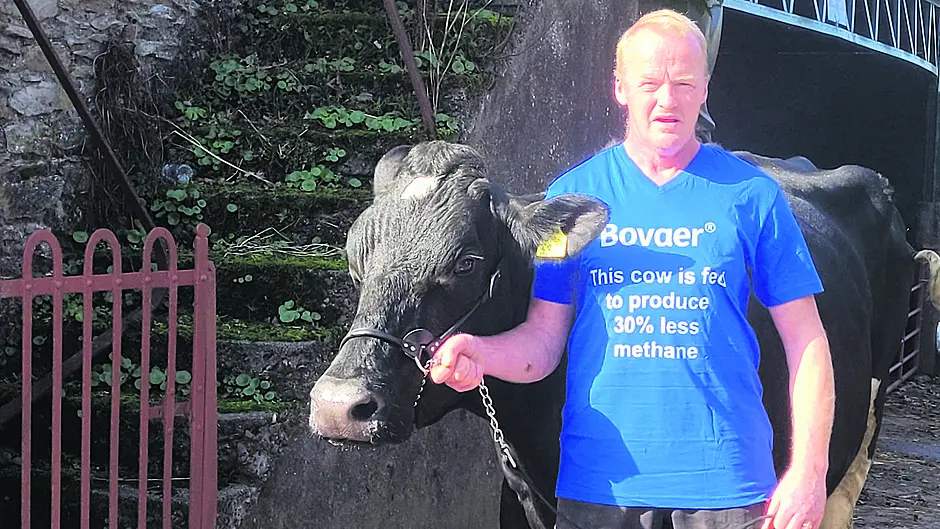Award-winning farmer Peter Hynes, who is using methane-reducing feed, feels there’s an agenda among policy makers nationally to reduce livestock numbers, in favour of supporting this proven innovation
PETER Hyne’s Aherla farm is the first commercial dairy farm in the country to use methane-reducing feed additives.
And even though the award-winning farmer is confident of getting the desired results from his cattle, he said he’s hugely frustrated by the fact that he won’t get any carbon credits for his efforts or expense.
Peter and his wife Paula have introduced Bovaer to 20 of their animals which, in a TMR (total mixed ration) system, is scientifically proven to reduce methane by on average 30%.
The innovative farming couple are currently feeding it to 20 of their animals, at a rate of 165g at 0.8%, based on 24kg of dry matter intake a day.
Peter said methane-reducing additives had been on his radar for some time, from the point of view of sectorial targets.
‘I wanted to know if this was just a fairytale myth, or if there was actually some potential behind it,’ he said.
He conducted his own research, and contacted DSM, manufacturers of Bovaer, and made the decision to get it on his farm, at a cost of €8 per cow, per month.
‘In two years, we could get the entire dairy herd’s methane, including the spring calving herd, down by 30%,’ he said.
That’s a positive, but that’s also the source of his frustrations.
‘If we are serious about reducing our emissions, which is what we’re hearing from the industry and government, I can’t understand why this isn’t being encouraged more, and put in front of other farmers,’ he said.
Peter feels there’s an agenda from within the coalition government to reduce livestock numbers, and he says the EPA needs to recognise methane-reducing additives and credit the dairy sector for those using them.
‘The research is done on this. There are 54 peer-reviewed papers globally showing that Bovaer reduces methane by 30% in a TMR system. The policies need to reflect that,’ he said.
‘Instead what we have are policies coming in from January 1st that are a cull by any other name.
‘The new nitrates plan will inhibit some of the very best farmers and dairy producers in the country who will have to reduce their herds, in favour of less efficient farms,’ he said.
He also feels strongly that his farm’s carbon credits should reflect the fact that his cows are producing less methane.
‘Right now, the benefit of what I’m doing is purely for the environment, as my methane output will be judged the same as any other farmer,’ he said.
‘A system needs to be put in place, very quickly, on every farm where all emissions can be calculated on the basis of things like how much land you have in clover, if you use Less, protected urea, Bovaer etc.
‘Just like the derogation audit, Teagasc needs to be able to give us a figure to show where we’re all at.
‘That would be crucial to showing that not all dairy farming is bad for the environment, and it would be a way of focusing attention on those who need to change how they work,’ he said.
FARM ZERO C IS ALSO ON BOARD
AS part of the groundbreaking Farm Zero C project, methane-reducing feed is being fed to 250 dry cows at Shinagh Farm.
Gavin Hunt, Farm Zero C project manager, said the innovative measure, which started last week, was always part of the plan for the demonstration farm, where research is underway to investigate the feasibility of creating a climate neutral dairy farm by 2027.
Carbery, in partnership with BiOrbic, (the national bioeconomy research centre), is spearheading the Farm Zero C project, just outside Bandon.
The interdisciplinary programme of work is targeting soil and grassland; animal diet and breeding; biodiversity; life cycle analysis; and renewable energy.
It is also considering business models and planning to ensure all proposed interventions are commercially viable. In addition, the project is looking at the potential for carbon trading to be integrated within a low emission farm model.
Shinagh Farm, owned by the four West Cork Co-ops, is the site of the project.
The farm is an intensive, highly stocked commercial farm which will allow the project team to prove that a new sustainable business model for farming is possible.The idea is that if it can be done at Shinagh, it can be widely applied anywhere.









